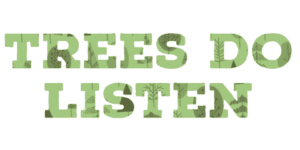Going on a road trip can be tricky for people that try to live a zero waste life. We recently went on a 3+ week road trip to Idaho, Utah, Colorado and Nevada. Our goal was to make it a road trip without packaging – no single use cups, plates, utensils or plastic containers. In attempt to plan ahead we brought the tools needed to avoid waste from the meals we ate on the go. We had some success, I will share with you what worked.
Zero Waste Road Trip Kit
Since we were going to spend a lot of time in the car we decided to bring along a box of reusable kitchen items to be used when possible. Inside our box we had:
- forks and spoons (a few butter knives would have been good too)
- water bottles, coffee mugs
- camping plates and bowls
- resuable sandwich bags
- food storage containers
- cloth napkins
- cloth produce bags and shopping bags
- cutting board
- a good knife for cutting veggies, fruit, cheese, bread
- bag designated for recycling (it was hard to avoid)
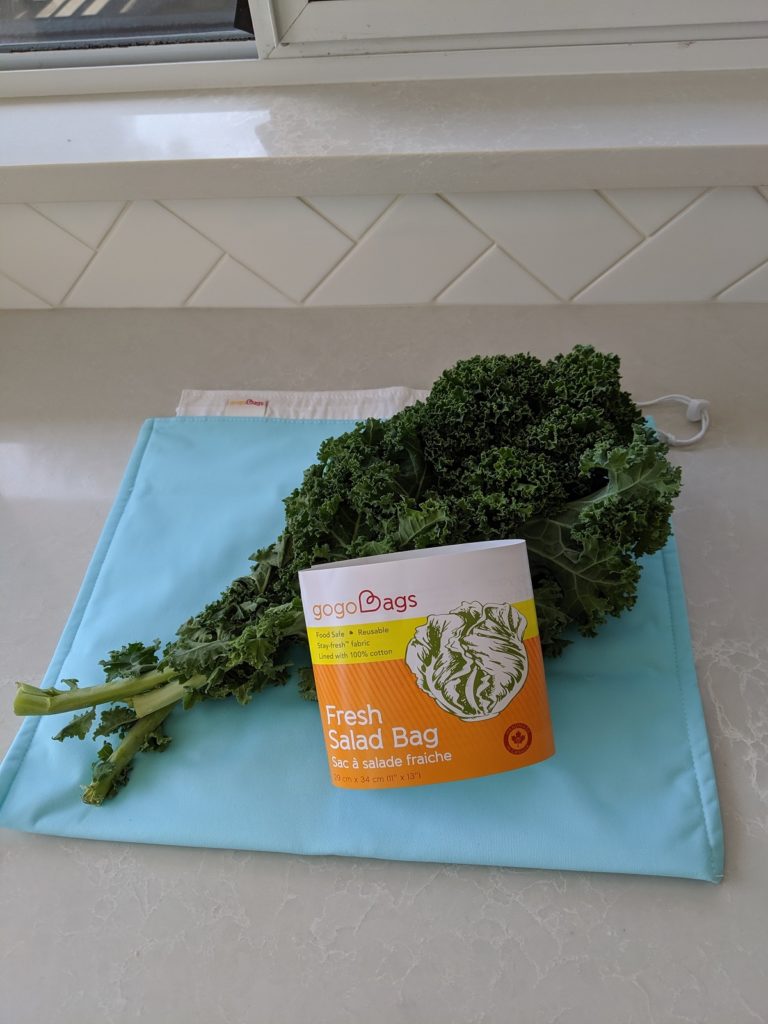
Now that we had our zero waste tools, it was time to use them. It took some time consistently remember our own utensils and food storage containers. Several times, I had to run back to the car from inside a store or restaurant to grab our utensils or containers for left overs. But every time we had a choice, we took the time to take this step. Eventually we didn’t forget anymore. We managed to avoid any disposable utensils on our entire trip – that was an easy one. The trick here was to pay attention when ordering to mention “no utensils please”. Also, we had to remember to wash the utensils each night from our hotel or apartment.
Grocery Stores
We thought stopping at a grocery store would be the best bet for food on a zero waste road trip. We sought out Whole Foods because we knew that they usually have great produce and organic foods. I was very disappointed with Whole Foods. They have a policy to not allow me to use my own food storage container at their salad bar or at their bulk section. So, we had to use their paper box for salad and their “compostable” soup bowl (which can only be composted at a special aerobic compost pile). They also lacked the recycling containers for the empty containers from the food we purchased there. In fact at one of the Whole Foods we visited in Frisco, they were asking for donations to pay for recycling which they didn’t even have! Zero Waste lunch at Whole Foods was a fail!
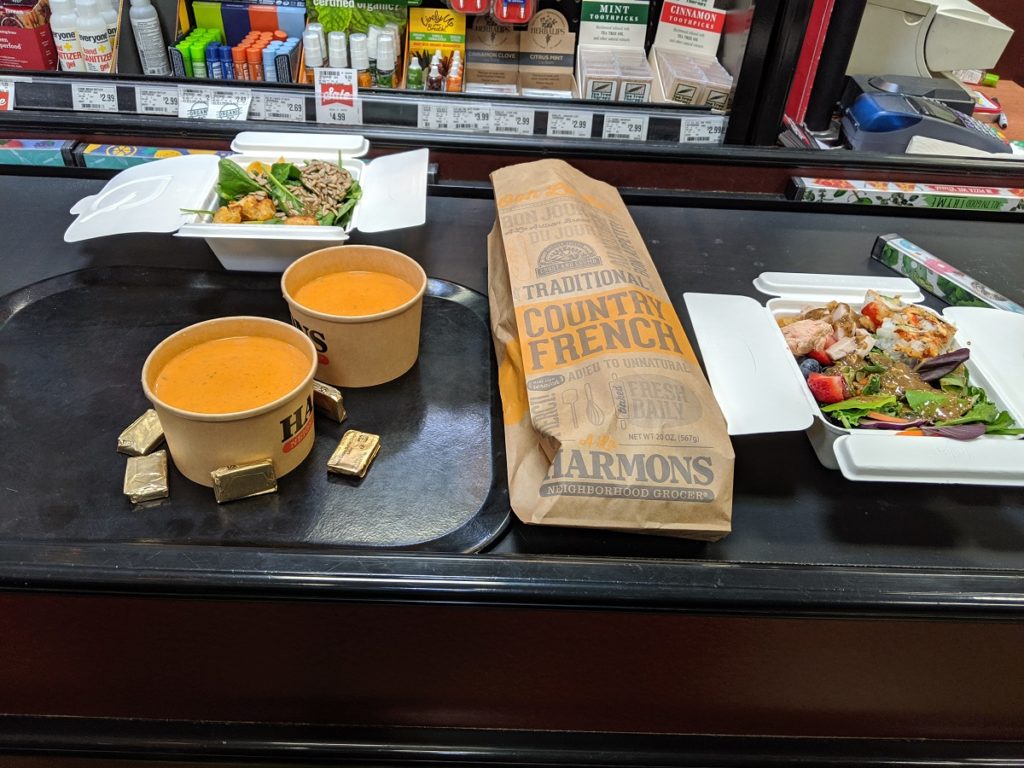
Grocery stores were good for finding vegetables for snacking. We had carrots and celery (we washed, cut and stored in our gogo bags). Apples, pears, grapes and oranges were great easy snacks too. Romaine lettuce turned out to be a great snack as well. I know it sounds boring but when your body is craving leafy greens, it was quite satisfying to chomp into a full head of lettuce. Unfortunately the scraps from these foods went to the trash because we didn’t find any compost along the way.
We usually had snacks for the car like crackers and cheese and hummus which all came with packaging (couldn’t find any zero waste stores in the spots we passed through). This is where a good knife and cutting board came in handy. We were able to recycle the hummus plastic containers and cardboard boxes at most Airbnb’s. The crinkly cracker and chip bags we had got cleaned and brought home with us to be dropped at our special recycling facility in North Vancouver.
Fast Food Restaurants
Our food choices were not always the best on the road. We ate once at Wendy’s, McDonald’s and Subway. It was not possible to avoid all of the packaging but we did not take any plastic bags, cutlery, drink cups or straws. We avoided the salads because they come in plastic containers with more packaged plastic ingredients inside (and they aren’t great salads anyways). When we ordered we told them that the order was not “to go” and we don’t want straws or utensils. Fast food is not a good option for a zero waste road trip!
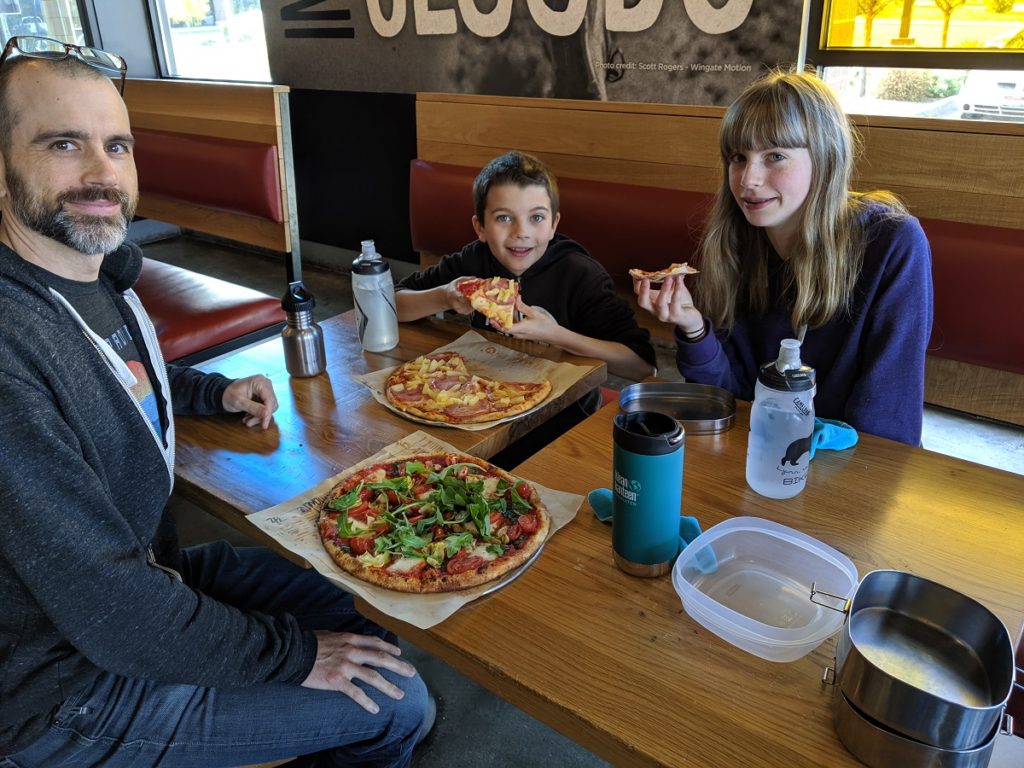
Most pizza places had minimal packaging especially the restaurants that we could sit and eat at. We made sure to bring our storage containers inside for the leftovers which made great snacks on the road. There was always a place to fill our own water bottles.
Continental Breakfast
We usually choose to stay in Airbnb’s at our destinations. But for the times we had a hotel, we were sure to bring our own plates, bowls, coffee mugs and utensils. I don’t think this is a common occurrence, we certainly got some interested looks and comments. People seem to respect our efforts and maybe they will even consider taking some similar actions in the future. Unfortunately the choice of food at a standard continental breakfast is not very healthy or tasty!
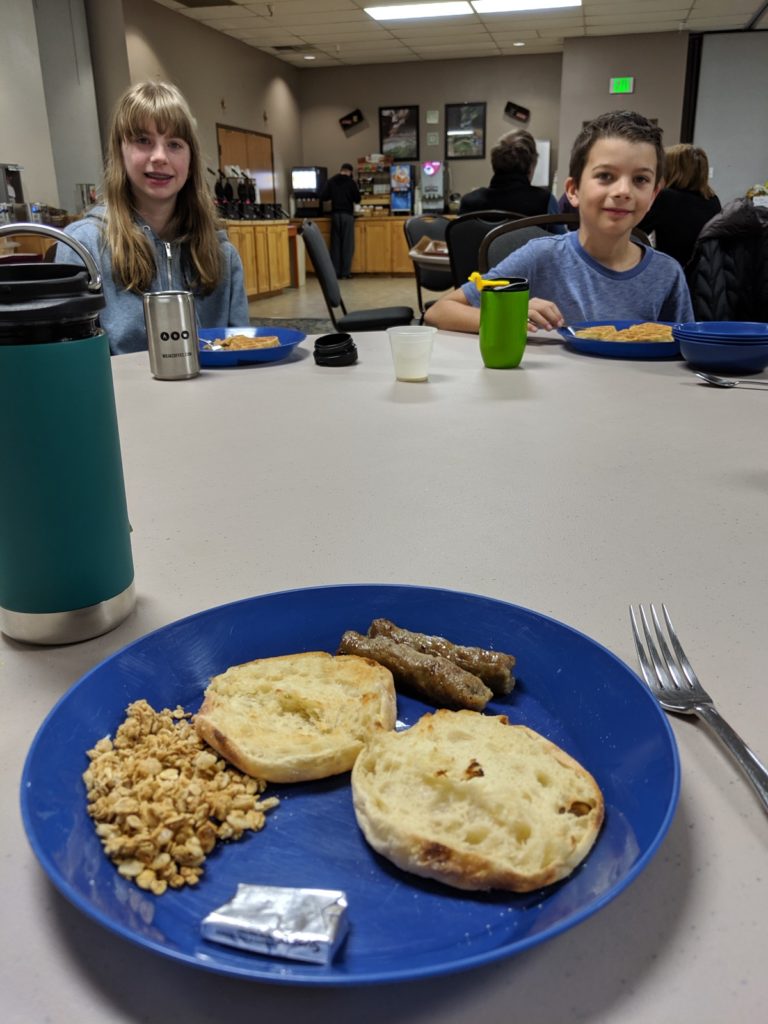
Compost Bucket
I have read about people keeping a compost bucket in their car for road trips. I considered this but it didn’t work out on this trip. On our first day, I kept my compost but couldn’t find a spot to put it. We stayed at an Airbnb that did not offer compost. In fact, on our whole trip only 2 nights of our accommodations had a backyard compost that they allowed me to use. I’m not sure if they have green waste pickup in the places we stayed or if they Airbnb hosts just don’t offer it. I really appreciated the home that did and I am very proud to offer it at our Airbnb in North Vancouver.
I considered keeping the compost for the entire duration of the trip but I suspected that might be a problem when we crossed the border back into Canada.
Recycling Facilities
Recycling is not ideal as a solution to food packaging but it is hard to prevent the need for it. On our road trip, we ended up with some materials that needed to be recycled. And it wasn’t always as easy and I thought it should be.
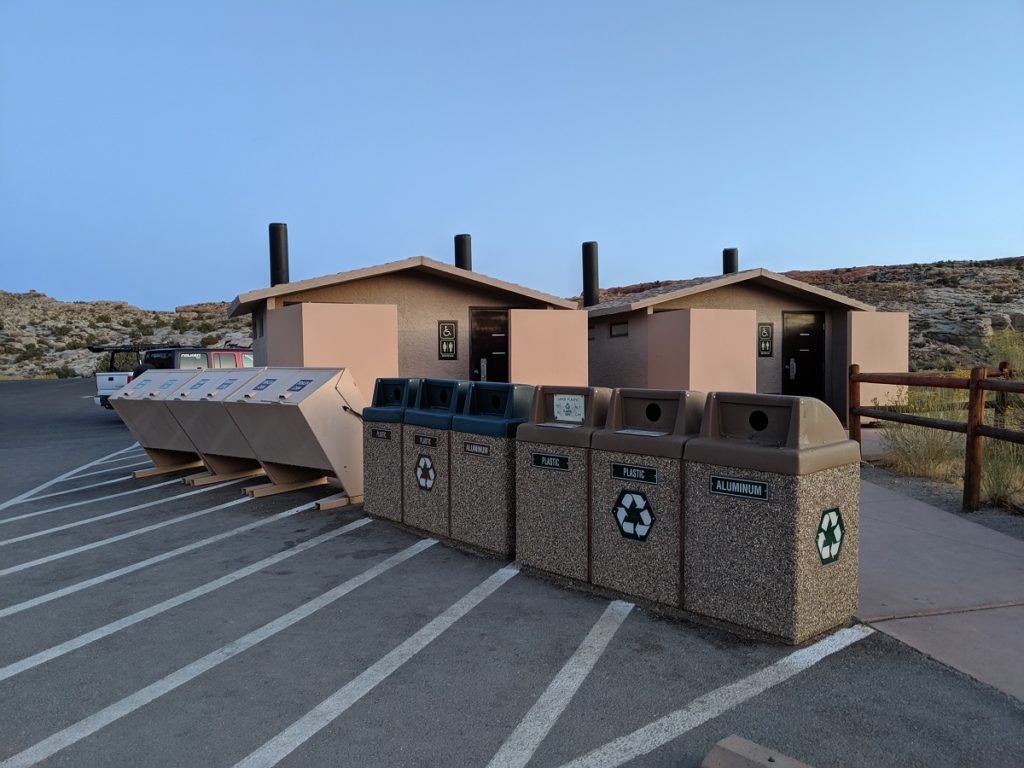
Utah does a great job offering the standard aluminum, plastic, paper recycling bins in public spaces. The national parks were especially impressive with plenty of opportunities to sort. We tracked down the recycling depot in Moab and saved our recyclables for the day we left. Unfortunately that happened to be a holiday and the center was closed. So we transported our small bag of recyclables to Colorado.
The options for public recycling in Colorado (Fruita and Fort Collins) was not as easy. When I did find bins, I couldn’t recycle glass bottles or crinkly bags. Green waste is not an option for homes in Fort Collins CO either. I did not take the time to investigate drop off facilities, they must exist.
At the end of our trip we spent a day in Las Vegas. I couldn’t believe the lack of recycling there. I did not find even one recycling bin in any of the public areas I was in. And I was actively looking! People were throwing their cans, plastic bottles and containers into the trash! And it was not an option to purchase any food or drinks without packaging. I looked into this further and discovered that the big hotels in Las Vegas have their own method of recycling where they hire companies to sort through their garbage and pull things out. This is very interesting to me, there will be more from me on that later! But just in case, I brought all of my recycling home to Canada.
Baby Steps to a Zero Waste Road Trip
Overall, it didn’t take much effort to decrease the waste and recycling generated on a road trip. Once my zero waste car kit was packed it was just a matter of attempting to use my reusables at any chance and to clean them afterwards so they are ready to go again. We did not succeed with a zero waste road trip – obviously road trips alone are not zero waste – but we did succeed in our efforts to reduce the potential waste. I hope the amount of packaging decreases from the stores in the future but for now we can politely decline in many cases.
Recent Content
Green Parenting - Tips To Raising Environmentally Friendly Kids
It is more important now than ever to raise an environmentally conscious next generation. Children are the future so let's be sure to raise them with a respect of nature! To raise...
Thinking about buying a new (or used) car is a big decision for most people. It is one of the biggest purchases people make in terms of expense and ownership time. The options can be daunting...
